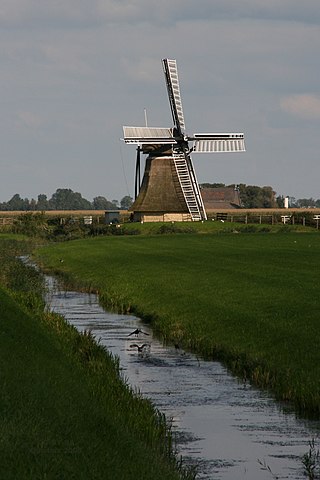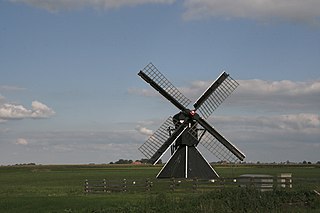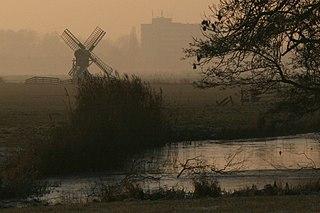
Mellemolen, formerly known as the Polslootpoldermolen or Spookmolen is a hollow post mill in Akkrum, Friesland, Netherlands which has been restored to working order. The mill is listed as a Rijksmonument, number 35937.

De Olifant is a smock mill in Burdaard, Friesland, Netherlands which has been restored to working order. The mill is listed as a Rijksmonument, number 35673.

Aylvapoldermolen is a smock mill in Burgwerd, Friesland, Netherlands which has been restored to working order. The mill is listed as a Rijksmonument, number 15626.

De Heimerter Mole is a hollow post mill in Burgwerd, Friesland, Netherlands which has been restored to working order. The mill is listed as a Rijksmonument, number 39348.

The Cornwerdermolen is a smock mill in Cornwerd, Friesland, Netherlands, which has been restored to working order. The mill is listed as Rijksmonument number 39329.

Kingmatille is a smock mill in Dronryp, Friesland, Netherlands which was moved to its present location in 1985. The mill is listed as a Rijksmonument, number 28614. The windmill is named after the nearby hamlet of Kingmatille.

De Hatsumermolen is a smock mill in Dronryp, Friesland, Netherlands which was built in 1878. The mill is listed as a Rijksmonument, number 28615.

Alde Swarte Molen is a Hollow Post mill in Easterlittens, Friesland, Netherlands which has been restored to working order. The mill is listed as a Rijksmonument, number 8531.

De Modderige Bol is a Hollow Post mill in Goëngahuizen, Friesland, Netherlands which has been restored to working order. The mill is listed as a Rijksmonument, number 34001.

Heechhiem is a Hollow Post mill in Goëngahuizen, Friesland, Netherlands which has been restored to working order. The mill is listed as a Rijksmonument, number 33999.

Kramersmolen is a hollow post mill in Goutum, Friesland, Netherlands which was built in 2002. The mill is listed as a Rijksmonument, number 24508.

Molen Hoogland is a Hollow Post mill in Goutum, Friesland, Netherlands which was built in 2004. The mill is listed as a Rijksmonument, number 24521.

De Haensmolen is a Hollow Post mill in Grou, Friesland, Netherlands which was rebuilt in 2007 after it was demolished by a boat in 2004. The mill is listed as a Rijksmonument, number 22917.

De Borgmolen is a smock mill in Grou, Friesland, Netherlands which was built in 2008. Although not in full working order, it can turn in the wind. It is listed as a Rijksmonument, number 22916.

De Oegekloostermolen is a hollow post mill in Hartwerd, Friesland, Netherlands which was built before 1830. The mill has been restored to working order. It is listed as a Rijksmonument, number 39347.

Miedenmolen is a smock mill in Holwerd, Friesland, Netherlands which was built in 1855. The mill has been restored to working order. It is listed as a Rijksmonument, number 38696.

De Edensermolen is a smock mill in Iens, Friesland, Netherlands which was built in 1847. The mill has been restored to working order. It is listed as a Rijksmonument, number 21575.

De Volharding is a smock mill in Jislum, Friesland, Netherlands which was built in 1872. The mill has been restored to working order and designated as being held in reserve in times of emergency. It is listed as a Rijksmonument, number 15632.

De Groene Molen is a hollow post mill in Joure, Friesland, Netherlands which was built c. 1800. The mill has been restored so that it can turn by wind. It is listed as a Rijksmonument, number 18208.

De Marsummermolen English: The mill of Marssum is a smock mill in Marsum, Friesland, Netherlands which was built in 1903. The mill has been restored to working order and is used as a training mill. It is listed as a Rijksmonument, number 28624.





















